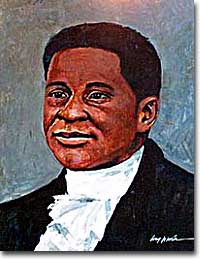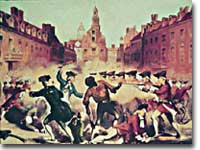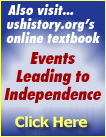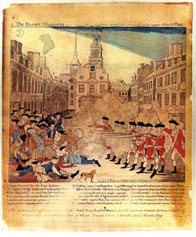
The Declaration of Independence
Lesson Plan
The Boston Massacre
- What is the “traditional” view of what caused the event and what happened during the Boston Massacre?
- What was the British commander’s view of the events and how did it differ from the colonists view of events?
- How did Paul Revere’s famous engraving influence the colonists’ reaction to the event?

Crispus Attucks is a name synonymous with the Boston Massacre. He was not only the first African American to die for the revolution, he was one of the first patriots to give his life for the cause.
The conflict over trade between the British and the Colonists was getting worse every day, and it was about to turn bloody.
All of the colonies were opposed to the Townshend duties. In fact, it seemed like more liberties were being taken away from them every day. But feelings about the British were strongest in Boston. Tension was in the air. British officials who were stationed in Boston feared for their lives. Smuggling was at an all-time high. Merchants like John Hancock were resisting the British by smuggling goods illegally. When the British tried to seize two of John Hancock's trading vessels, Boston was ready to riot. Lord Hillsborough, who was in charge of American affairs for the British Parliament, ordered four regiments of troops to be moved to Boston.
The British Make the Americans Skittish
Boston political leaders Samuel Adams and James Otis had concerns about this military presence. Less than three weeks before the British troops arrived, Bostonians held a meeting in Faneuil Hall to discuss their anger and make a plan for how they were going to respond. Many wanted to riot, but when the redcoats actually arrived on October 1, no one acted. Instead, the people of Boston showed restraint.
The other 12 colonies were very interested in what was happening in Boston. How would this military presence affect them? What if their fears about British tyranny were true? The colonists could not deny the significance of having a standing army stationed in Boston. The longer the army stayed, the less the colonists trusted the British government. Even moderates, who often would side with England on political issues, recognized that Americans' civil liberties were being threatened.
The Massacre
The events of March 5, 1770 were a turning point. A mob of about 60 angry townspeople approached the British guards at the Customs House in Boston. The guards called for back up from their fellow soldiers nearby, but the crowd became unruly, hurling rocks and snowballs at the British soldiers. In the heat of the moment, the British fired before they were commanded to. All in all, they killed five men, including Crispus Attucks, a former slave. Many others were injured, as well.
Find a link about Crispus Atticus and evaluate its worthiness.
Trial and Error

Five men were killed in the incident known as the Boston Massacre. Among them was Crispus Attucks, a former slave.
A trial was held, with Thomas Preston, captain of the British soldiers and eight of his men charged with murder. The jury had to decide if the soldiers had fired in self-defense or with malice, and which ones actually killed the victims. A verdict of murder meant the death penalty. Two other soldiers were convicted of manslaughter, but were sentenced only to thumb branding, not to any jail time. The lawyer who represented the British soldiers was John Adams.
Some colonists might want to ask John Adams, "John, why would you defend the British soldiers, they are our enemies? We thought you were on our side!" How do you think Adams would respond?
Around the same time of the Boston Massacre, Parliament decided once again to relent on taxation. As a result, all the Townshend duties were repealed except for the tax on tea. This decision would later prove to be a mistake for the British.
With most of the taxes repealed, the Massachusetts legislature was called back in session. Some colonists wanted to continue the tea boycott until all taxes were repealed, but most Americans went back to buying British imports like normal.
But even though some problems were settled, the events in Boston from 1768 through 1770 were not forgotten. Taxes and laws were one thing, but bloodshed was another. The Boston Massacre taught Americans a lesson about the British. They learned that the British would use force to keep Americans obedient.
If it could happen in Boston, where would it happen next?
You are marching in protest against having to buy goods imported only from Britain, regardless of where they originated. What does your poster say?
- What is the “traditional” view of what caused the event and what happened during the Boston Massacre?
- What was the British commander’s view of the events and how did it differ from the colonists view of events?
- How did Paul Revere’s famous engraving influence the colonists’ reaction to the event?
Start page | The Document | A Reading | Signers | Related Information | Jefferson's Account | Declaration House | Declaration Timeline | Rev. War Timeline | More Resources | Lesson Plan |





